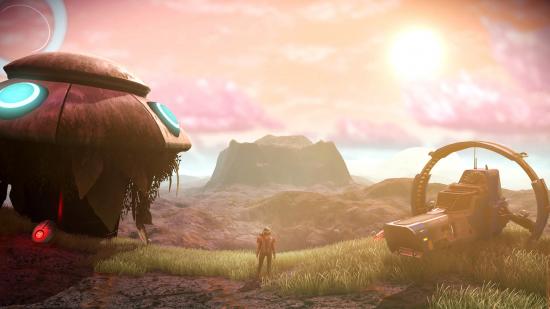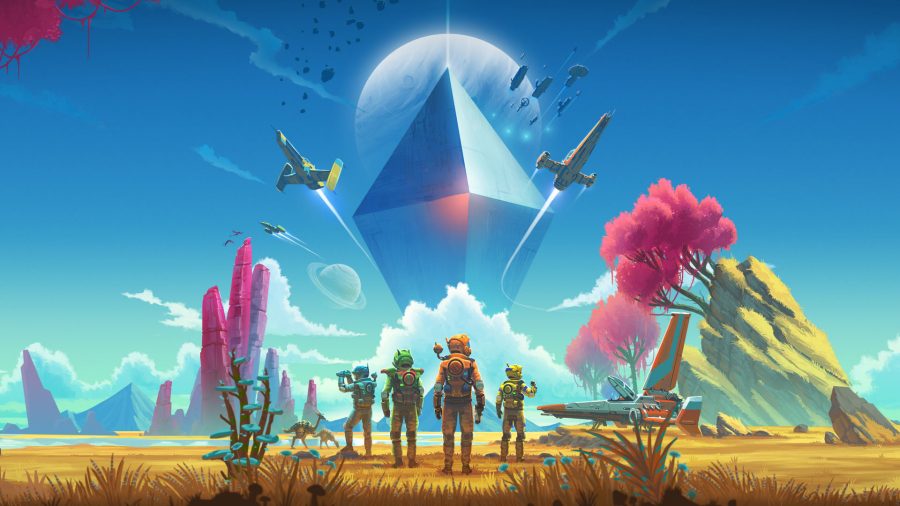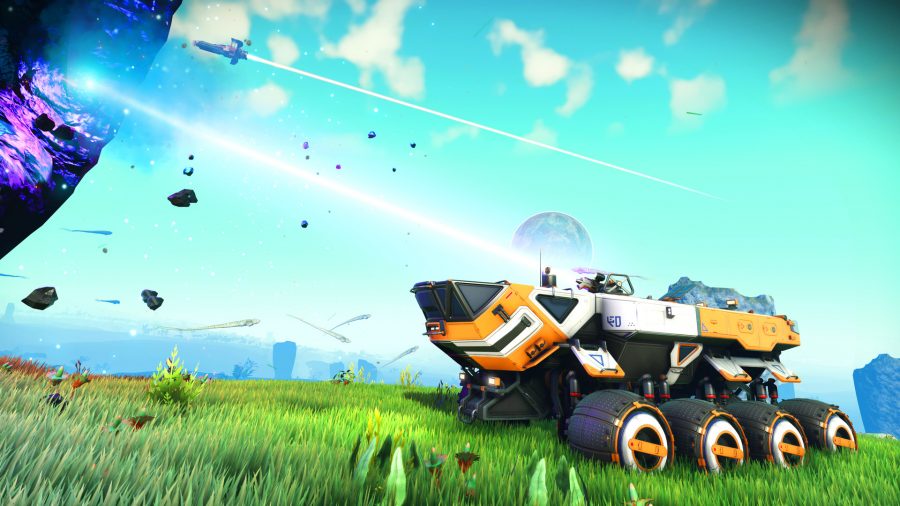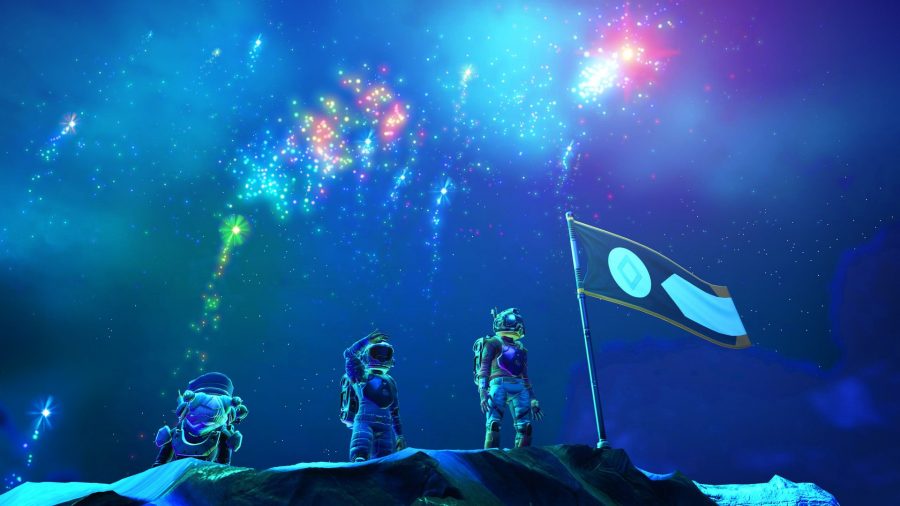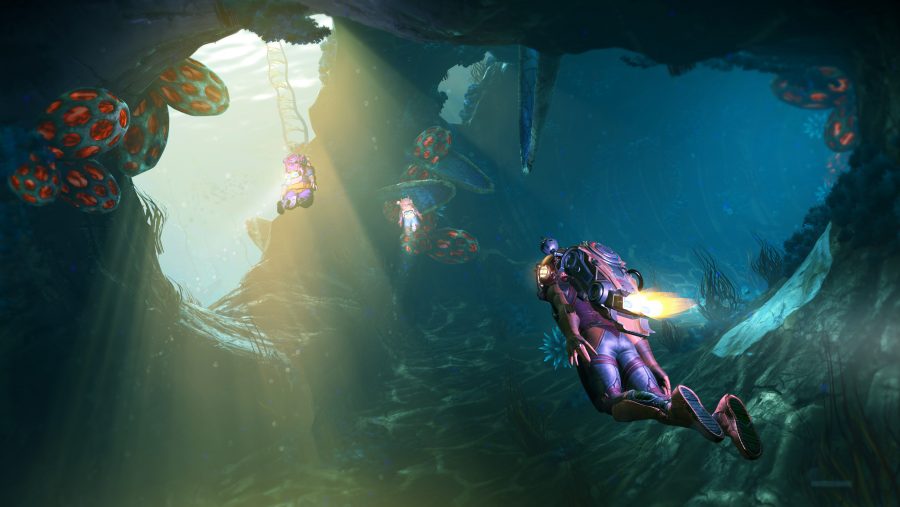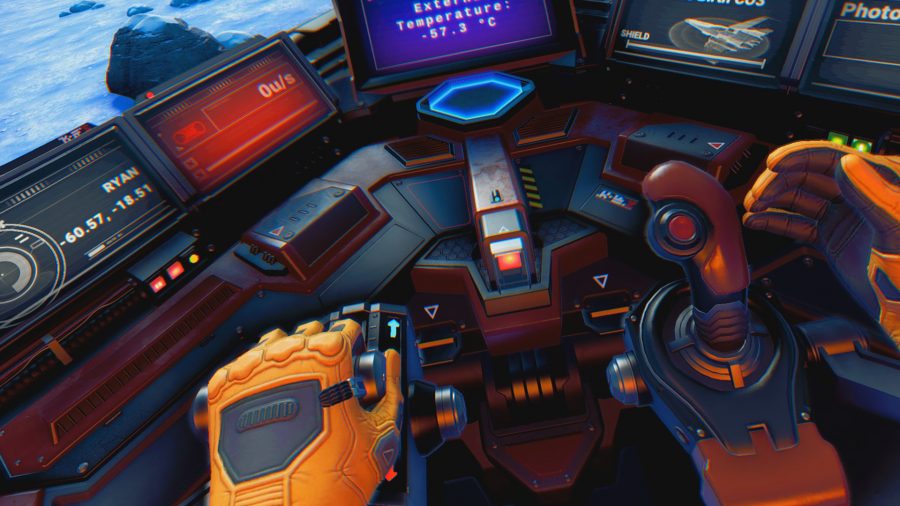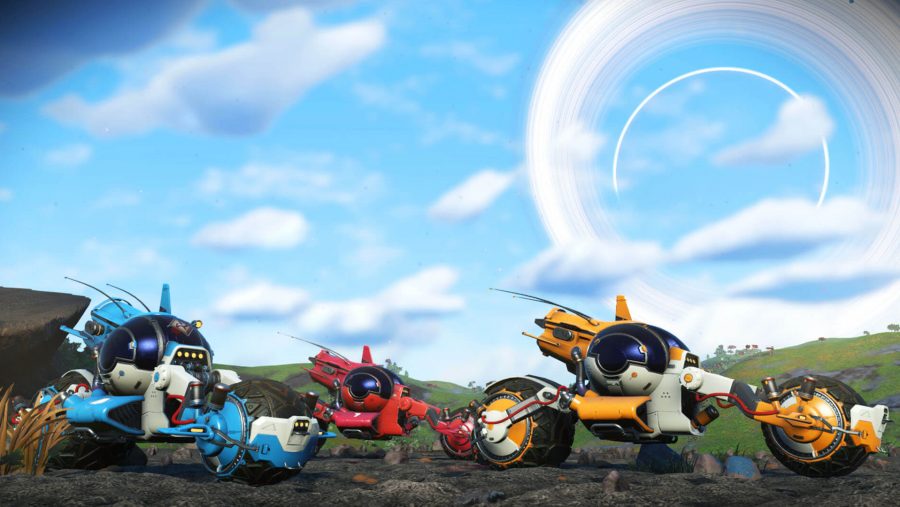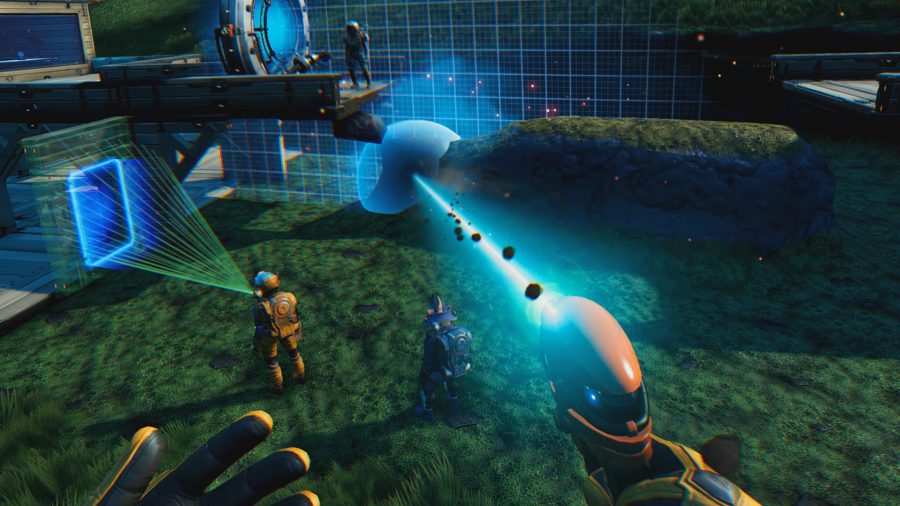With some huge, game-changing updates already behind it, and another – Beyond – on the near horizon, No Man’s Sky has come a long way since launch. With updates like Foundation, Path Finder, and NEXT having introduced popular features like multiplayer, base building, and vehicles, the game is in better shape than ever, with player time reflecting this. The average No Man’s Sky player now plays the game for 45 hours, which is up from around 25 hours at its launch three years ago.
While its journey to this point has been a little rocky at times, Hello Games’ action-survival adventure continues to thrive, with the “most ambitious chapter so far”, Beyond, bringing a three-part, multiplayer-focused expansion to the game – the second stage of which will include VR support. With a nomination for ‘Best Ongoing Game’ alongside titles like Fortnite and Rainbow Six: Siege at last year’s The Game Awards, it looks like the sky definitely isn’t the limit for the indie title.
To talk about where No Man’s Sky is now and looking forward, the evolving relationship with its player base, and why he sometimes hopes his games aren’t too successful, we spoke with game director and Hello Games founder Sean Murray at this year’s Develop: Brighton conference.
PCGN: How do you think No Man’s Sky is performing today? Are you happy with where it is?
Sean Murray: I don’t know if I’m ever happy with the game when I look at it. You probably don’t look back on writing you’ve done and think, ‘that’s the best thing ever’. It’s the same when you’re working on a game, you just see all the things you wish you could fix, or that could be better. That’s part of what drives us. It’s amazing when we come to the end of an update, you think we should just be done and never look at it again, but really quickly afterwards, literally the next day or whatever, people are like: ‘wish we’d done this’ or ‘shame we didn’t get time to do that.’
Where we are now, numbers-wise, we came out at launch and we sold very well. It was a very polarised launch, but it the average person played around 25 hours. So for every person who played for like an hour, you’ve got people who are playing for 50 hours or whatever. We tended to skew very high with some people, they played it like it was their forever game, for hundreds of hours. That became a metric that we started to really care about – not that we want people to be playing our game for ages, but because we don’t have many traditional gameplay loops to entice people along. They are playing it because they enjoy it; they want to see the next planet or whatever it is.
So as we’ve been doing updates, that’s something that really motivates us. The person who’s buying the game, buying NEXT, generally plays about 45 hours on average, which is a really high number in the scale of things. There are very few games in a year that I play for 40 or 50 hours, so we’re happy with that. We’re more excited about how we take people who’ve played for that long and keep it novel and interesting and let them see it in a new light. Or how we bring people who might be interested in the concept of the game, but either didn’t get on with it or haven’t tried it before, and seeing how we ensure they enjoy it.
We talk a lot about catering for many different ways to play. I think if you played the game at launch there was very much one vision, and now it’s like, ‘Oh? You like doing this, you like base building? You do this, you do that.’ That’s where we are now. There are parts of that I’m really happy with, and there’s part of that when I’m like ‘I really need to change that’.
In a recent interview you said you’ve been surprised (and of course pleased!) about players’ continuing excitement for the game, and for updates like Beyond. Why do you think they keep coming back?
I think about this a lot, like way too much. We gathered some numbers, and we have some idea about what people do in the game, but it’s always very hard to tell why. A person plays for 50 hours or a hundred hours – why are they doing that? It’s fascinating to get under the skin of that. Obviously a core part of it is exploration; there’s that feeling that we always wanted to get across, of landing on a new planet where no one’s ever been before. You definitely see that driving people.
But we know that no matter how exciting that is, eventually it wears off, right? Maybe after 100 planets or 1,000, even the crew of the Enterprise got bored and needed a holiday. So an interesting thing has started to happen – [for] players at the moment, base building is a huge thing, which kind of surprised me. We introduced it after the fact, we never really talked about it before, and when we did people were like, ‘I don’t understand, I’m supposed to be exploring. Why should I be building a base?’
But it’s the second biggest thing people spend their time doing. Weirdly, something we didn’t predict, is that’s fed a lot into people exploring. So you get this neat thing where people land on planets, and what they’re really hoping for is, has somebody been here before and has somebody built something? That’s the thing we want to make more of in the next update and Beyond, is just that feeling, and empower people a little bit more to be able to do that. There’s something really unique about seeing something someone else has built and put there before you. I find it, myself, really engaging as we can obviously just go through places that people have uploaded, just like ‘what were you thinking? [Laughs] What was going on in your mind? Why did you put this here?’ It’s like finding some sort of relic, like ‘what does this mean?’ And you find some weird, weird things out there. I try to picture the person, like that’s them on a Saturday – ‘sure, I’ll just build a taco stand.’
It must be great to see that moment when you’ve given players this product and they’ve done these surprising things with it.
Yeah, it’s neat. It’s feeding our own exploration a little bit. We’d like to make more of those kind of things. Watching what people do with the game is really engaging, which I hadn’t really anticipated. You’d think it would be predictable what people would do with your game.
How has your relationship with No Man’s Sky’s players evolved? How will engage with them going forward, such as on patch notes?
I think players are normally almost always right about problems. That’s the thing I always find. They’re almost never right about the solutions, or can never agree on them, anyway. The useful feedback is: ‘I don’t like that thing’ or ‘I want to do more of this’. [But] then they’ll tell you crazy things they want you to do to solve that. Often you’re better off taking a broader view of all the things people are saying, stepping back and boiling it down to data, and deciphering what that means. [That’s] one of my favourite things to do in my little programmer brain.
In each of our updates, we normally do one big thing. So for Foundation, we did base building, in Path Finder we had vehicles, and in Atlas Rises we had story. That would be at the top of the patch notes, then about 70% of the notes are just community-driven stuff. I think that we’re a bit different in how much time we spend on stuff that, if you didn’t play the game, would be meaningless to you.
You’d be like ‘so they revamp the inventory system, like, what do I care? I don’t even know what their inventory system is.’ We just spend a lot of time on that. We started doing that because we just, like I was saying, wanted to communicate with the community and that was our way of doing it. Rather than getting on the forums and saying all-caps, ‘no, you do like our inventory system, actually, you’re using it wrong’, we said, ‘no, we’re going to communicate this way’. We started doing it for that reason.
You wouldn’t think that it would end up causing the game to sell well or for more people to come in. But weirdly, what we’re finding, by the time we get to NEXT, is actually we’ve made so much improvement to the game that it’s just getting better. For those people coming in now, this is always the best time to come in and start playing. Almost, we see that with the community where some of them, they just start recommending it more to their friends, ‘you got to play now. Now is a good time.’ We still get that a lot. When the NEXT trailer came out, just so many people talking about forcing it on their friends, like ‘now, now you’ve got to play it.’ It’s really nice.
Given the increase in live, evolving games, what do you think the future of this type of game is? Do you think the release dates when developers say they’re ‘done’ will become more fluid?
I don’t know. For what we wanted it to do, we felt like No Man’s Sky was largely complete when it was released. I would have killed for a little bit more time to work on the game, but I would still sit and play it and think, ‘yeah, it evokes the kind of emotions that I want it to evoke.’ I talked about these things with other people on the team years before – very few games make you feel lonely, right? Very few games make you feel awe or wonder. And I felt at times – not all the time, but occasionally – we were hitting those things, so I was really happy. I knew the game would be a bit polarising, but that was unique. I hadn’t really seen that much before.
So we were super happy to see that go out and it felt finished, and I think that’s really important, but there were still so many things we wanted to do. We could have, and maybe should have, gone Early Access or something with No Man’s Sky, but it didn’t really appeal to me. I wanted to get a singular part to the point where we were really happy. It’s been fun to build on that, and say, ‘You! Gamer, over there. You’re not interested in playing a game about loneliness, but you can own a freighter now!’
When NEXT came out it did well, and we started getting nominations for best evolving game or best ongoing game, that kind of thing. The awards table is pretty much always the same, it’s Rainbow Six: Siege, Fortnite, Warframe, and we’re up against all these big games each time. And a bunch of them had either a slightly odd launch or a lukewarm launch – I definitely read articles saying, ‘these games are dead’ at some point.
Where I would love to see change is that, when people are doing something ambitious or different, we not get too focused on the launch. That might mean that maybe not everyone rushes into the launch to buy at that point, or it may just mean that we don’t judge it on that launch. Look at Fortnite. Do you judge it on that launch, or on its impact?
[Let’s] take a more considered view of where a game is going to get to, because sometimes that noise harms a game and shuts it down, when what the community normally want is for it to get better, and to have their voices heard. There’s got to be a way to do that. I wouldn’t like that process to stop, because it’s resulting in some of the best games we’ve ever had, but there’s got to be a way to manage expectations a bit better.
What would you say you’re most proud of now that No Man’s Sky is three years old? Is there anything that made you think ‘yes, this is really great?’
I don’t know if I have that. Like I was saying at the start, I just think ‘oh this could better’. But there’s a really nice thing that we have achieved, especially as a small team, which is landing on a planet that no one had ever visited, and that being generated in 3D. That hadn’t been done before. As a technical innovation – I’m a programmer, so – I think that’s really cool. But I know that there’s many ways we could have made that better, or make that better in the future.
Actually, the thing I think about if I’m trying to make myself feel better, is I feel super lucky that I’ve gotten to work on a game that’s had a bit of an impact. I’ve worked on lots of games before, and they’d never been one of those games that for some people is like their ‘forever game’, that they spend a huge amount of time in and explore all the edges of.
I worked on games like Burnout, which people love, but they would play them and put them back in the box. I’d assumed I would work my whole career and not get a chance to make something that was a bit systemic, or captured people’s imagination. So I feel really lucky to have done that.

You’ve said you’re more interested in working on something new than on a sequel? Would you like to see other studios go the same way?
You think of maybe Assassin’s Creed as having like, 4,000 people working on it, or whatever. I like to daydream about what they could do if they did something that wasn’t Assassin’s Creed. Like, the money and the talent on that team is unbelievable, and for them to be let loose on other things is really exciting. It probably wouldn’t work, everyone would collapse, you know, that kind of thing. But it would be amazing to see.
Some of the best teams in the world are making the same game they made last year, but with some small differences. I’ve done that for a bunch of years; we were doing one Burnout, and then the next and then the next, and we would always talk about what’s the one thing that we’re changing, which is kind of sad. One big thing, that’s not that much.
So now we’re a little bit free from the commercial constraints we had before. Making a sequel just isn’t as exciting to me – I’m only gonna get to make so many games, so why not make new weird, wild games? That’s that’s kind of where my head is at. I have nothing against other studios making sequels. It makes sense and all, but I wouldn’t do it unless I had some real burning passion for it.
A bit of what drove us to do No Man’s Sky was that we did Joe Danger and Joe Danger 2, and the moment I started Joe Danger 2 I felt a bit of heartache – I felt worried, actually, that it would be so successful that we would end up having to do three, and then four, and then: this is my life. It’s a weird situation where you don’t want that to happen, like: ‘I hope this doesn’t do too well.’
Given that, and now that it’s three years after launch, do you have an idea of No Man’s Sky’s life cycle? Or is it just as long as you’re creatively energised about it, you’re going to keep going for it?
I think it’s that, and we make no promises there, but we are creatively inspired at the moment, and that feels nice. It feels like the community probably wouldn’t want us to keep working on it if we weren’t, you know what I mean? They might initially enjoy that, but eventually, they’d be like: ‘we’re just getting, you know, skin packs’. Nobody would want to see it go out like that.
Related: No Man’s Sky VR brings personal scale to endless space
There’s also a real balancing act between, you know, are we most creatively inspired to make No Man’s Sky, which we are at the moment, or is it the other things that we’re doing? So there’s almost an opportunity cost at some point – when other things are becoming more exciting, I just think you’ve got to follow that.
